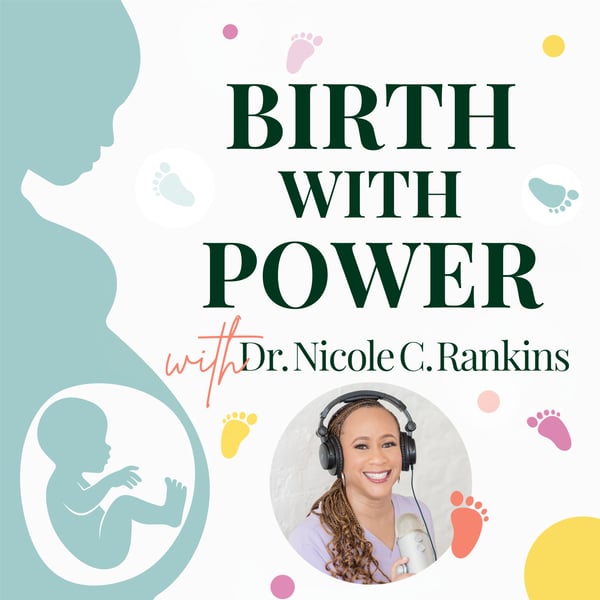Baby Aspirin In Pregnancy - Should You Be Taking It?
Birth With Power
Dr. Nicole C. Rankins
4.9 • 637 Ratings
🗓️ 14 December 2023
⏱️ 13 minutes
🧾️ Download transcript
Summary
In this episode you'll learn why we prescribe baby aspirin, who should take it and how much.
Low-dose aspirin (81 mg/d a.k.a. baby aspirin) reduces the frequency of preeclampsia, as well as related adverse pregnancy outcomes (preterm birth, growth restriction), by approximately 10-20%.
Low-dose aspirin should be started after 12 weeks and ideally before 16 weeks and continued daily until delivery.
Low-dose aspirin is recommended for:
- Pregnant individuals with one or more of the following risk factors:
- History of preeclampsia
- Carrying more than one baby (twins, triplets, etc)
- High blood pressure that was present before pregnancy (chronic hypertension)
- Type 1 or 2 diabetes that was present before pregnancy
- Kidney disease
- Autoimmune disease (ie, systemic lupus erythematous, antiphospholipid syndrome)
Pregnant individuals with 2 or more of the following risk factors:
- Having your 1st baby
- Obesity (ie, body mass index > 30)
- Family history of preeclampsia (ie, mother or sister)
- Black race (as a proxy for underlying racism)
- Lower income
- Age 35 years or older
- Personal history factors (eg, low birth weight or small for gestational age, previous adverse pregnancy outcome, >10-year pregnancy interval)
- In vitro fertilization
Learn how to make a birth plan the right way in my FREE class - drnicolerankins.com/birth-plan
Our Sponsors:
* Check out Avocado Green Mattress and get 10% off! https://avocadomattress.com
* Check out Ritual and get 25% off! https://ritual.com/DRNICOLE
Advertising Inquiries: https://redcircle.com/brands
Privacy & Opt-Out: https://redcircle.com/privacy
Transcript
Click on a timestamp to play from that location
| 0:00.0 | In this short episode, you're going to learn about baby aspirin in pregnancy, why we prescribe it and whether or not you should be taking it. |
| 0:13.2 | Welcome to the All About Pregnancy and Birth Podcast. I'm Dr. Nicole Calloway Rankins, a board certified OBGYN who's been in practice for nearly |
| 0:22.9 | 15 years. I've had the privilege of helping over 1,000 babies into this world, and I'm here to help |
| 0:29.8 | you be calm, confident, and empowered to have a beautiful pregnancy in birth. Quick note, |
| 0:36.7 | this podcast is for educational purposes only and is not a substitute for medical advice. |
| 0:42.3 | Check out the full disclaimer at Dr. Nicole Rankins.com forward slash disclaimer. |
| 0:47.0 | Now let's get to it. |
| 1:00.3 | Hello there. Welcome to another episode of the podcast, whether you are a new listener or you've been here before. I am so grateful you're spending some time with me today. So I want to talk about |
| 1:06.5 | baby aspirin in pregnancy because I get asked about this quite a bit. And the short answer to why baby aspirin |
| 1:16.6 | is prescribed in pregnancy and is it safe is yes, it's safe and it's prescribed in order to reduce |
| 1:22.9 | the risk of preeclampsia. So what exactly is preeclampsia? Preeclampsia is a potentially dangerous |
| 1:29.4 | complication in pregnancy that is characterized by high blood pressure. If that top number for the |
| 1:35.3 | blood pressure, the systolic blood pressure is above 140 or 140 or above that is concerning. If it's |
| 1:42.5 | 160 or above, that is very concerning. If the diastolic |
| 1:46.2 | blood pressure, the bottom number for the blood pressure is 90 or above or 110 and above, that's |
| 1:52.8 | very concerning as well. Preeclampsia usually begins after 20 weeks of pregnancy, and it's in women |
| 1:58.3 | whose blood pressure was previously normal. And the issue with |
| 2:01.9 | preeclampsia is that it can lead to serious and in rare cases, even fatal complications for both |
| 2:08.1 | moms and babies. Now, I talked about how it's characterized by high blood pressure. Again, |
| 2:13.4 | that top number being 140 or above, at 160 is very concerning, 90 or above is concerning |
| 2:19.1 | 110 or above is very concerning for the bottom number. |
| 2:22.3 | There can also be protein in the urine. |
... |
Please login to see the full transcript.
Disclaimer: The podcast and artwork embedded on this page are from Dr. Nicole C. Rankins, and are the property of its owner and not affiliated with or endorsed by Tapesearch.
Generated transcripts are the property of Dr. Nicole C. Rankins and are distributed freely under the Fair Use doctrine. Transcripts generated by Tapesearch are not guaranteed to be accurate.
Copyright © Tapesearch 2025.

